Canadian in Kanyama
"Kanyama?"
the teller queried me, with a polite but reserved smile.
What I had put down on the bank's form just didn't seem
right to her. I look like a typical affluent white foreigner,
and I had put down an address in Kanyama, the black slum
on the western side of Lusaka. "Yes, Kanyama,"
I affirmed. "At the parish?" she ventured, spotting
the little golden cross pinned to my shirt collar. Parish
is not the word I would have used, but she had the right
idea, so I nodded my assent. I was living in a poor and
sparsely decorated township of Lusaka, Zambia's capital,
because I was on assignment for Frontline Fellowship.
White
men are not merely sparse in Kanyama, they are altogether
absent. Though I lived there for most of my three month
Zambian trip, I only saw other white men there if they came
to visit my host. The people in the neighbourhood thought
I was a remarkable sight, too. Whenever I moved through
the street, children would excitedly greet me with a well
practiced "How are you?" In response to my reply,
they would sustain the exchange by again asking, "How
are you?" Their English repertoire seemed a tad limited,
but they were delightfully friendly. Sometimes they would
persist until I was out of earshot. The children would also
call out to me as "Mzungu! Mzungu!" (white man).
The adults too, were quick to give friendly greetings as
I passed them in the way. Celebrity came easily with my
white skin, even though I have never appeared in any movie.
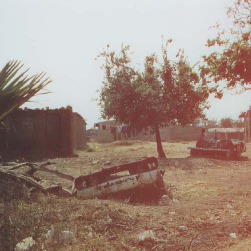
Kanyama:
Vehicular skeletons, like these, and deep holes, like the
one they're in, abound
My
host informed me that typically only the Roman Catholic
missionaries lived among the poor they ministered to, while
the Protestants took residence in the affluent parts of
town, where the other white folks live. The Catholics were
more successful, because they had the right idea. The example
of our Lord was, "the Word was made flesh, and dwelt
among us" (John 1:14), and the disciple is to be as
his Master.
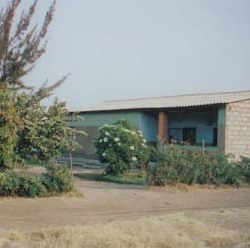
Though
Kanyama is garbage strewn, some residents maintain islands
of beauty.
Immediately
after we had completed Frontline's Great Commission Course
(GCC), our Field Director Tim took Brett and me into Zambia
to introduce us to the field. Tim conducted a week of ministry,
then left us in the care of local pastors and departed to
fulfill other tasks. Brett could only stay one month, but
I remained for three (August-October). When we reached Lusaka,
we were warmly welcomed by some of the Zambians who had
participated with us in the GCC. "Now you're in the
real Africa!" they said. South Africa did not count
to them, having too much of the stamp of Europe upon it.
Zambia was certainly a very different society from the Western
civilization I grew up in. Living with a local bishop in
the heart of the slum gave me a really good introduction
to real life in the real Africa.
Part
of African culture is being late for everything. In the
West, it is a time-honoured tradition for the bride to be
a little late for her wedding, and her only. At the African
wedding I attended, even the minister did not show up until
80 minutes past the time appointed. They think it proper
to wait for all the late people. We think it rude of the
late people to willfully make others wait for them.
Another
cultural difference was cutlery, which most Zambians do
not bother with. Some made it a point of cultural pride
that they eat even the messiest of foods with their fingers.
While
poor folk in oriental cities get around on bicycles, these
are rare in Lusaka. Folks either walk or take a taxi, which
is not the same as a North American taxi, but rather is
a combi (mini-van) running a bus route. In Africa, how many
can you fit in a taxi? Always one more.
Although English is the official language, it seems to have
this status for its utility as a second language to most,
as it is the first language of few. It serves as a medium
of communication between the 73 different language groups,
but within a community the local African mother tongue shows
itself much better understood and preferred. Bwanali Phiri,
our gracious host, instructed us that, "In heaven,
there will be no American, no Canadian- only Chichewa."
While
a classic Frontline newsletter tells a tale fraught with
peril and hardship, this one must break faith with the genre,
because God not only kept the dangers at bay but far away.
When I returned to Cape Town, someone said, "So, you
managed to cope!" "With what?" Life without
running water, bathing pitcher-and-basin style, subsisting
on a rudimentary and unfamiliar diet, living out of a backpack,
dust so ubiquitous that your white clothes need washing
after every wearing, being isolated from all your family
and friends- it was just an extended urban camping trip.
I
have tried my best, but as you can see, I can only come
up with trivial grievances unworthy to be complained of.
The Zambians were very friendly and welcoming, so being
a lone white man in a black community was neither lonely
nor frightening. If ever I was careless about the security
of my belongings, he who stepped forward was not a thief
but a benevolent stranger who would warn me about thieves.
At every turn God positioned people to look out for me,
not to harm me. It doesn't make for an action packed newsletter,
but it does testify to the fulfillment of my home church's
prayers that I should be delivered from unreasonable and
wicked men, and that the Gospel may have free course (II
Thess. 3:1-2).
We
spent our first week at Frontline's Covenant College in
Eastern Zambia. Tim conducted seminars while Brett and I
helped with the construction of new facilities. Being a
missionary requires a willingness to do some workman's math-
adding some calluses to the palms of your hands and taking
away some bark from your knuckles. The apostle Paul, the
great missionary pioneer, set for us this example of labouring
with our hands (Acts 20:34-35, II Thess. 3:7-9), and said
"Be ye followers of me, even as I also am of Christ"
(I Cor. 11:1). It was an inspired policy then, and it still
is now. The counsel of God does not go out of date.
Some
students at Covenant College said the program had taught
them to understand the whole Bible, a great blessing after
years of performing pastoral ministry without such knowledge.
They said that many pastors draw their sermons from just
one or two books of the Bible, being at a loss to comprehend
the rest. For this cause our Zambian partner Eugene Kalunga
stressed to us the importance of continuing the work of
Covenant College. The local Christians must be equipped
with Biblical knowledge if they are to turn back the advances
of Muslims and witch doctors in eastern Zambia.
The
distressing level of ignorance among the pastors is an extension
of general conditions in Zambian society. Operation World
states that while official literacy in Zambia is 78%, functional
literacy is under 25%, and declining. In the poor side of
Lusaka, a typical bookstore was really a stationary shop
with a few elementary school textbooks on hand, and maybe
a dozen or two real books. In the bourgeois side of town,
there were a few genuine bookstores. All told, there was
very little literary supply for a city of three million.
In all my time among Lusaka's poor masses, I never saw anyone
reading a book, though the people spend plenty of time out
in public view. Basic reading and writing play a small part
in the economic transactions of daily life, but billboards
and soapboxes do not stimulate literary prowess. I reckon
this cultural disinterest in reading is why many of the
Christians had not valued having a personal Bible enough
to have procured one. In Europe before the Protestant Reformation
of the sixteenth century, the common folk were also described
as ignorant and unlearned. The Reformers transformed society
by popularizing the notion of education for the masses,
that they might comprehend the riches of the Scriptures.
Zambian society seems to be part way down this same path
of improvement, but the task will not complete itself without
hard work. Thankfully there are a lot of missionaries in
Zambia, but there is room for more. Pray the Lord of the
harvest to send forth reapers (Matt. 9:37).
The
bulk of my trip was spent in Lusaka and its rural environs,
working as part of local evangelist Bwanali Phiri's team.
There was no shortage of local churches eager to have a
foreign missionary as a guest preacher. Often Brett and
I felt too highly honoured, the beneficiaries of reverse-racism.
Some African societies have an animosity against white men,
but we found none of it in Zambia.
Bishop
Bwanali also runs a Christian elementary school, and I had
the pleasure of teaching daily during my final weeks there.
We also taught Bible study groups at churches and participated
in several evangelistic crusades which the Zambian ministers
were running. During the day we would do hut-to-hut evangelism
or hand out Scripture booklets in the markets, and at night
show a Gospel film. At Chikumbi after several days of such
evangelism, the crusaders put some poles in the ground and
stretched plastic sheeting across them to make four walls
for the new church's inaugural service, which was the next
day. I asked the leader who would pastor the new church,
and he said the pastors would get together that afternoon
and decide that amongst themselves.
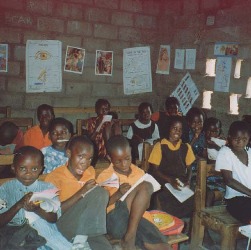
"My
Kids" - the class I taught.
One
rural crusade that we participated in involved camping on
location. When we saw that Bwanali and five of his men had
no other shelter but his combi, Brett and I insisted that
three of them use our tent. We laid out our sleeping gear
under the open sky. The Zambians made comments that, "You're
the REAL missionaries!" because we were sleeping in
the open on such a cold night. I think it was around 15C,
which is on the low end of the scale for them. That's the
mid-range of the scale in my part of Canada, so I thought
it was a great night to enjoy sleeping under the stars.
They thought we were making a noble sacrifice, while I was
enjoying the fresh air. Bishop Bwanali told us afterwards
that what really impressed his compatriots was that we white
men had insisted on three young black men taking the tent
instead of ourselves. A little dash of the spirit of Mark
10:43-45 can go a long way, and sometimes it doesn't even
feel like a sacrifice.
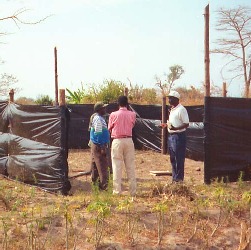
First
service tomorrow!
Adults
were quick to receive the World Missionary Press (WMP) booklets
when we were handing them out, and the children were eager,
too. Too eager, rather. I would soon have two dozen children
gathered round about, clamouring for the booklets. The problem
was some kept coming back into the scrum to entreat for
more. As I went along it was impossible to keep track of
which children I had given to, and we found that some had
ten or more stuffed in their pockets. When Brett and I started
requiring a demonstration that they could read before we
gave them a booklet, we found that most could not. That
did not stop them from clamouring for the booklets, so I
had to wade through the children to keep distributing to
adults. (Children were plentiful on the street because the
government school teachers have been on strike since the
beginning of the year). We hope and pray that from little
hands which cannot read them the booklets will find their
way to those who can. We came to Zambia with over 30,000
WMP's, and had expended them before the first month was
out. When Tim came to fetch me, he brought another 30,000+
to resupply our Zambian colleagues.
One
day as we were in Kanyama handing out WMP's, some of the
sots outside a bar took them with thanks and urged upon
me that their boss inside the bar needed me to bring him
one. I offered him an extra, that he might bring it. No,
I must bring it, he insisted. I opted to keep working my
way among those outside the bar. Then I spotted Brett in
front of the bar's verandah in a heated argument with nearly
a dozen men pressed close around him. I stepped in close
to Brett, so they could see he had support, and the two
of us strode through the midst of them into open ground.
Had there been a fight, we had been badly outnumbered, but
the Lord restrained them and there was no violence. The
quarrel had begun when Brett went into the bar to distribute
WMP's; they closed around him and tried to loot his pockets.
He bolted outside, they followed, and he had turned to confront
them when I spotted him. They were brazen thieves, but we
thank the Lord that they were neither adept nor violent.
Brett lost nothing.
Since
this was a foreign society to me, often I prayed to the
Lord to show me what the people in Zambia need to hear,
so that I could preach relevant sermons. One Sunday as I
was preaching the final minutes of my sermon, a heavy truck
pulled up right outside the church door. The spectacle and
noise of this machine executing a protracted parking maneuver
a few metres from the door forced me to pause my sermon.
After the service I found out that the truck was delivering
sand and bricks so the men of the congregation could work
that afternoon on the incomplete building we had met in.
Perhaps, I reckoned, this is a divine intimation that they
need some teaching on the Fourth Commandment, which says
that the Sabbath day is sanctified for worshipping God and
work is therefore forbidden.
At
the end of my trip, Tim and Rob linked up with me on a short
trip of their own. We ministered for a week in Kabwe at
Excellence Christian Academy, a model school which lives
up to its name. Principal Eugene Kalunga, ECA's founder,
expresses his conviction about the importance of sterling
Christian education with the saying, "The trees of
today are the forests of tomorrow." We had the privilege
of teaching classes in the mornings, and in the afternoons
we conducted lectures from our Biblical Worldview Seminar
to teenage students from several schools.
A
week was also spent at Covenant College, helping them begin
moving from a rented property to new facilities on Frontline's
own property, even as classes concluded and the College
held its first graduation. I did more workman's math, chiefly
installing electrical wiring on new facilities. Mrs. Fraser,
the Principal's wife, treated us to such good cooking that
we agreed if our supporters knew of it, it would jeopardize
our reputation for working in austere conditions.
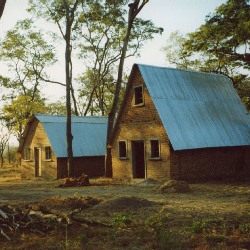
New
buildings at Covenant College.
On
the wall above my bed at Covenant was a 9cm-baboon spider,
with a thorax the size of a grape. Tim advised that creepy
critters are less spooky if you think of them as pets; I
dubbed it "Herman", and went to sleep.
We
made a brief foray into Zimbabwe to deliver food and literature
to a local pastor. Why are we in the food delivery business?
Zimbabwe's economy is withering and collapsing under the
direction of President Robert Mugabe. (See Frontline News,
2003 Edition 1). His ZANU-PF government has been seizing
farms from white farmers as retribution for the alleged
crimes of colonialism. Farms which once provided food and
income for the nation now lie neglected and fruitless. International
observers estimate that over five million people are in
danger of starvation in the coming months. In Harare, the
capital, we found restaurants still serving at regular prices
and fresh produce on sale at the roadsides, so at first
blush no problem appears. However, racing across the country
by highway and stopping briefly in the cities does not make
you knowledgeable about socio-economic conditions, aside
from the most cursory details. The pastor told us the prices
are now out of reach for most peoples' incomes, and it is
expected to get worse. Ironically, it is the rural areas,
where food should be produced, where sustenance is most
scarce.
Zimbabwe
looks normal when you drive through it, but I am told the
society is really imploding. I beheld dozens of service
stations operated by familiar multi-national petrol companies,
and they looked fine at first glance. A more observant look
revealed that none of them were operating their pumps or
even posting prices. I am told that the government has put
a cap on fuel prices and will not adjust for the skyrocketing
inflation as Zimbabwe's currency continues to disintegrate.
Back in May inflation reduced the real worth of the set
price in Zim dollars to less than the real cost for service
stations to fill their pumps, so they have all closed. The
country's fuel now comes through the black market, via the
ridiculously inefficient means of individual citizens crossing
the borders and filling their tanks and jerry cans.
Zimbabwe's GDP has fallen 40% in the last 4 years, and next
year looks worse. Inflation is somewhere over 500%, so high
and volatile that economists have trouble ascertaining it.
Frontline News, 2003 Edition 1, reported $1USD trading for
1200-2000 Zimbabwe dollars. We found roadside moneychangers
giving as much as 5000 Zim dollars per American dollar.
Curiously, the Internet site I checked on 20 November for
currency exchange showed the Zim dollar holding steady around
800 to the USD all year long. People sometimes question
why Frontline field workers give a version of events so
different from what the news agencies report. All I can
say on this one is, we report what we find on location,
and somehow the international banking system is working
with a very different scale. Another site listed 800 per
USD to sell Zim. dollars, but no rate to buy them. A third
listed neither rate, so perhaps some banks are giving up
on Zimbabwe's currency altogether.
Since
Zimbabwe is a socialist police state where either official
policy or any soldier's capriciousness can do you a world
of hurt, including summary execution, we went in braced
for trouble. President Mugabe is very hostile to white people,
so we might encounter such hostility from any of his agents.
Earlier this year importing food without permission was
illegal, which is pretty bizarre for a country with mass
starvation predicted to be just over the horizon. The allegation
against the government is that they wanted to ensure any
food went to the friends and members of the ruling ZANU
party, and none others. The excluded group would include
our Christian friends. So, as we were laden with food, we
were glad that we encountered few officials and those we
did were in no mood to converse, politely letting us pass
with little inquiry. We thank the Lord for opening a smooth
path before us.
According
to Operation World (2001), 85% of Zambians are Christians.
Many taxis have Christian slogans on them, and Christian
sayings are posted in many public buildings. My favourite
was, "Many who plan to seek God at the eleventh hour,
die at 10:59." Now consider that phrase from another
angle. "Many to whom we would preach the Gospel at
11:00, die at 10:59." Although 85% are counted as Christians,
most are not well grounded in the Word. There is a great
need for discipleship teaching, so that the genuine Christians
may be rooted and built up in Christ Jesus (Col 2:6-8),
and those who mistake themselves for Christians may see
that they are not and remedy their situation.
Today,
the doors of Zambia stand open for Gospel messengers. We
have free access, the Gospel has free course, and the people
gladly receive the Word and the man who brings it. Tomorrow,
all this may change. Some Africans are proud of their traditional
culture, with all its heathen aspects, and given the chance
would lead their people back into the darkness of animism
from whence years of missionary activity have delivered
them. Islamists are working hard to subdue all of Africa
to their false religion. Marxists and other irreligious
opportunists may gain political control, such as they have
in many African countries. If the knowledge of our Lord
and Saviour Jesus Christ does not fill Zambia more and more,
some pernicious doctrine will secure the country and close
the door. Now, while the door is open, ask God in what manner
you can promote His Kingdom.
I
leave you with a verse from the hymn, "From Greenland's
Icy Mountains":
Shall we, whose souls are lighted
With wisdom from on high,
Shall we to men benighted
The lamp of life deny?
Salvation! O salvation!
The joyful sound proclaim,
Till earth's remotest nation
Has learned Messiah's Name.
In
Christ,
Lawren
M. Guldemond
lguldemond@yahoo.ca
Frontline Fellowship
PO Box 74 Newlands
7725 Cape Town
South Africa
|

 Guldemond Travel Log
Guldemond Travel Log


 Guldemond Travel Log
Guldemond Travel Log
